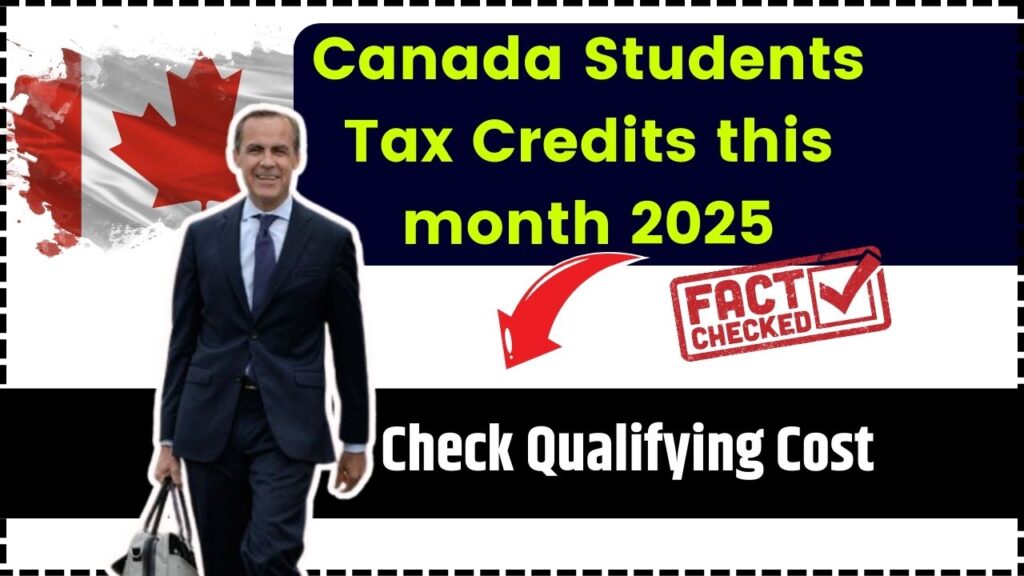
Canada Students Tax Credits this month 2025: Pursuing higher education in Canada is a significant investment, and understanding the available tax credits can substantially ease the financial burden. This guide delves into the various student tax credits available in 2025, providing clear insights into eligibility, qualifying costs, and application processes.
Canada Students Tax Credits this month 2025
Understanding and claiming student tax credits in Canada for 2025 can help you save hundreds — if not thousands — of dollars. Whether you’re paying tuition, repaying student loans, or moving for school, these credits are designed to ease the cost of education. Take time to organize your paperwork (especially your T2202 and interest statements), understand your eligibility, and file your return on time. If you’re unsure about anything, contact the Canada Revenue Agency or speak to a certified tax professional.
| Tax Credit | Eligibility Criteria | Qualifying Costs |
|---|---|---|
| Tuition Tax Credit | Enrollment in a post-secondary institution with tuition fees exceeding $100. | Tuition fees, admission fees, lab/library fees, application fees. |
| Canada Training Credit (CTC) | Canadians aged 26–65 earning $10,000+, below third tax bracket. | Tuition and fees for eligible training courses. |
| Student Loan Interest Credit | Interest paid on government student loans (not private). | Interest on eligible federal/provincial student loans. |
| Moving Expense Deduction | Full-time students who moved 40km+ closer to school. | Travel, storage, temporary living expenses. |
| Basic Personal Amount | Income below the basic threshold ($15,000 in 2025, subject to final confirmation). | Not a credit, but results in zero federal tax owed below the threshold. |
Understanding the Tuition Tax Credit
This non-refundable tax credit helps you reduce the amount of income tax you owe based on eligible tuition fees.
Who Qualifies?
You must be:
- Enrolled at a post-secondary institution.
- Paying tuition over $100 in a calendar year.
What Can You Claim?
Examples of eligible expenses:
- Tuition and admission fees
- Exam fees
- Lab or library charges
- Application/enrollment fees (if enrolled)
If you paid $4,000 in tuition, you may be eligible for a credit worth 15%, or $600, against your federal tax.
You’ll need the T2202 form from your institution to claim it.
The Canada Training Credit (CTC)
The CTC is a refundable tax credit, meaning it can result in a cash refund, even if you owe no taxes.
Key Points:
- Available to Canadians aged 26 to 65
- Must have earned income of $10,000+ and not be in the top income bracket
- You accrue $250/year in credit, up to a $5,000 lifetime cap
Use your Canada Training Credit limit (shown on your Notice of Assessment) to claim eligible training expenses when filing your taxes.
Claiming Canada Students Tax Credits
You can claim a non-refundable tax credit for interest paid on your government-issued student loans.
Requirements:
- Must be loans from federal/provincial student aid programs
- Loans from banks or lines of credit are not eligible
- Interest payments from the last 5 years can be carried forward
Use Line 31900 on your tax return.
The Moving Expense Deduction for Students
If you’re a full-time student who moved 40km or more to attend school or a co-op job, you’re likely eligible.
Expenses You Can Deduct:
- Travel (gas, flights, taxis)
- Storage and shipping
- Temporary accommodations (up to 15 days)
- Meals during travel
File using Form T1-M, and keep all receipts.
Student Tax-Free Threshold: The Basic Personal Amount
For 2025, Canadians can earn up to $15,000 without paying federal income tax. If your income falls below this, you may not owe anything — though you should still file your tax return to claim:
- GST/HST credits
- Provincial benefits
- Tuition credits (to carry forward or transfer)
Other Benefits to Consider
GST/HST Credit
Low-income students may be eligible for quarterly payments to offset sales tax expenses.
Provincial Programs
Some provinces, like Ontario and British Columbia, offer additional credits or education-related tax relief.
Canada Tax Return Last Date in March 2025 – Check Refund Dates & Amount
Canada Tax Refund 2025: Who’s Getting Paid in March & How to Apply
Extra Tax Refund In Canada For 2025 – Will you get this refund? Check amount & Date
FAQs About Canada Students Tax Credits this month 2025
1. Can I transfer my tuition credit to a parent?
Yes. If you don’t need the full credit, you can transfer up to $5,000 to a parent, grandparent, spouse, or common-law partner.
2. Can I claim both the Tuition Tax Credit and the Canada Training Credit?
Yes. If you’re eligible for both and have eligible tuition expenses, you can apply each credit to the same amount — though they’ll reduce your tax bill differently.
3. What happens if I don’t use all my credits?
Unused tuition or training credits can be carried forward indefinitely (tuition) or up to five years (interest credits).
4. Do I need to file taxes if I earned less than $15,000?
Yes, even if you earned below the tax-free threshold, you should still file to access refundable credits, benefits, and to carry forward unused credits.
5. Are online course fees eligible for the Tuition Tax Credit?
Only if the course is offered by a designated educational institution and meets CRA’s guidelines. General “skill-building” courses from private platforms (e.g., Coursera, Udemy) are usually not eligible.







